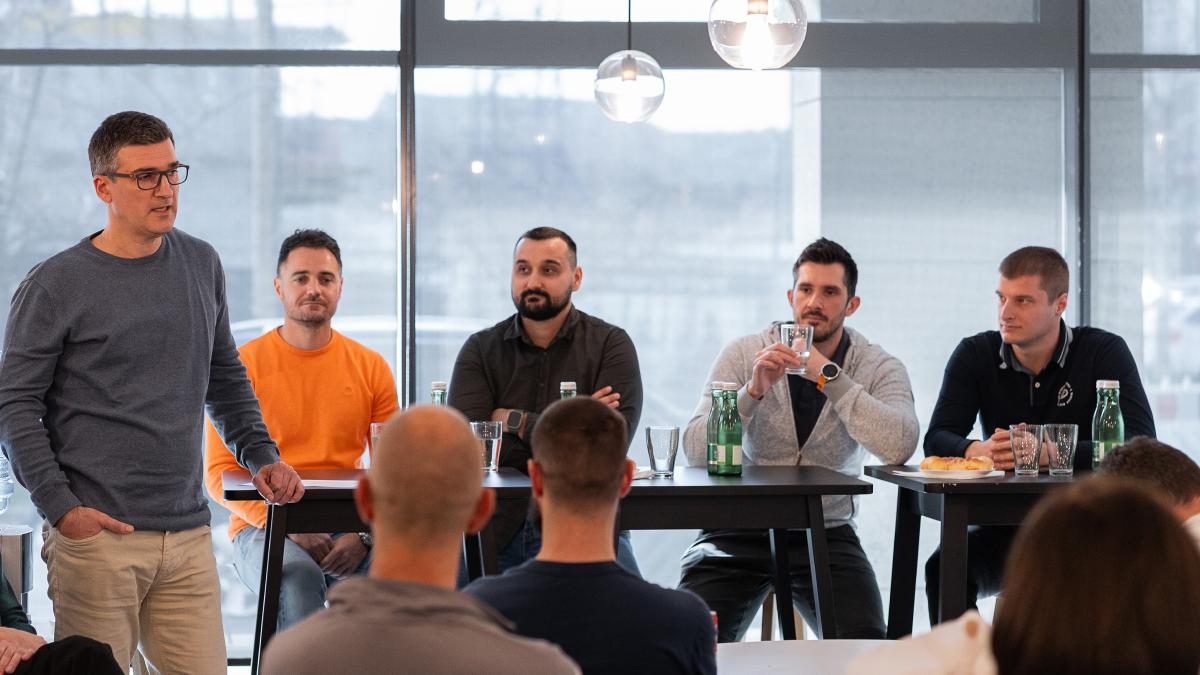HTEC’s newly appointed Chief Revenue Officer Nathan Elsberry has leveraged a wide range of professional interests and responsibilities into an illustrious career in the tech industry. Over the course of less than two decades, he has blazed a path that took him from a software engineer to the North American Head of Sales with one of the biggest technology companies in the world.
Nathan’s wealth of experience and insights represent a valuable addition to HTEC Group that will be felt across a wide range of areas of the company’s operations. On the eve of his appointment, we were curious to learn more about his professional path and his guiding principles for his new role with HTEC.
Compressing more than two decades of experience into a few sentences is an ungrateful task, but that didn’t stop us from putting Nathan on the spot right off the bat…
“I started my career in the US Navy. I joined straight out of high school and performed tactical technology oversight for the next four years. After I completed my service and was honorably discharged, I went to university and got a degree in Wireless Engineering. So, my studies were very tech focused, and my career has been as well. I started working on the Delivery side in a large tech company. Then, over the span of a few roles in different companies, I transitioned into Sales. It was my “night job” early on, as my primary responsibility was looking after large delivery programs. From there I transitioned more and more into full-time Sales. It turned out that I was pretty good at it, and I enjoyed it, so I kept doing it more and more. Eventually, my work was entirely focused on Sales. I went from delivering individual contributions as a salesperson to leading North American sales. Now I am here in HTEC looking to add as much value as I can to overall HTEC sales.”
What was the impetus behind the shift from a technical career to a career in sales?
“I firmly believe that if we are selling something, we must know what it is that we are selling and understand it at the lowest level. There is great value in the “golf and dinner” approach to building client relationships, but I feel it is important to go beyond that – to truly understand what we are doing and what value we are adding to our customers.
Being a part of Delivery has made me a better salesperson. It allowed me to span the fence between relationship building and lead generation to actual delivery and service implementation. For me, that’s the sweet spot where we’re not just selling fingers on a keyboard but providing solutions and value to the customers and their organization.”
How did your military experience impact your future career?
“Coming from a small town in southern US, joining the military was very eye opening. We were all these different people from all these different places, and yet we were all connected by a common mission. There is a very important lesson there on how a shared vision overcomes and erases individual differences, as well as how the unique aspects of our culture, background, and preferences can produce significant value.
This lesson was immensely applicable and helpful to my future career. I’ve worked in a French-based company, an Indian-based company, and a US-based company, communicating with people from all parts of the world. I have been exposed to cultural nuances on a daily basis. Today’s global tech industry is a great melting pot that makes the whole industry better. Our ability to understand cultural nuances enables us to generate greater value for our customers, makes us better partners and better people.”
How would you define your approach to sales?
“Sales is not about selling at all. In our industry, it is about customer relationship building and taking a consultative approach to solve a customer’s problem and add value to the organization. My biggest Sales philosophy is the “Then what?” conversation. Let’s say a client comes to us and says that they want us to make some sort of a solution. Instead of simply agreeing, I like to say, “OK, then what?”, because it is crucial that we understand where the client is headed.
Having that “Then what?” conversation is the very nature of consultative selling, because we’re not thinking about it as a project. By asking what happens next, we move from a project mentality to a partnership mentality where we can become the technology partner of choice and support our customers on their path forward. It is all about working with them to understand what problems they are facing, and then formulating a solution and a way to approach that problem.”
What is the best advice you have ever received?
“One of the best pieces of advice I ever had was from a leader I deeply respected back in the military, and it is this: the holy grail of leadership is having a friend relationship with your entire team while simultaneously having their respect and willingness to pull in the same direction. Throughout my career, it wasn’t always an easily attainable thing, because it is impossible to have the same level of relationship with everyone, but it is important to strive for that holy grail. If I do that, I find that it creates a good balance, even if I have more of one than the other.”
What is the “right” project for HTEC?
“Right out of the gate, I need to make one clarification: I want no projects. I want partnerships with our customers. I want to build relationships where we can solve their problems and ensure that we are giving them what they need and that they are doing the same for us. I firmly believe that greed is good, and many people don’t like that, but there is one caveat: greed is good if it is mutual. We need to be greedy for bringing the most interesting and challenging work into HTEC, and then make our customers “greedy” for the value we produce. The biggest part of building relationships and partnerships with our customers is making sure that it is mutually beneficial. It is my responsibility to make sure that we are negotiating transparently about what is most important for HTEC, so that the customers can be open about what is most important to them.”
What is the plan for the next year?
“It is certainly going to be very busy. I am not ignorant enough to think that I have all the answers. I have a lot of experience and a lot of thoughts about what I would like to do, but I am also aware that HTEC has been around and been successful for a long time. The first thing I need to do is understand what makes HTEC so successful and what is the secret sauce that’s so amazing. Only then can I offer ways to improve and add to it. My approach is to learn, observe, and understand what makes this place so great that I and so many other people want to join, and then understand what value I can bring to make it even greater.”
Nathan Elsberry is building a team of close collaborators to help raise HTEC’s impact to the next level. If joining him in this quest sounds intriguing, consider applying for the following roles:






